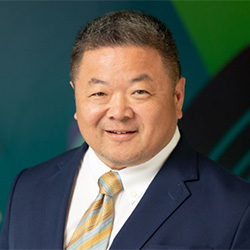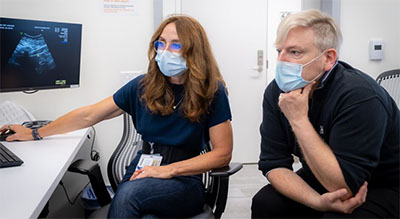Pregnancy, Birth and Beyond: The Future of Fetal Care at Seattle Children’s
August 6, 2025
As one of the most comprehensive fetal centers in the Pacific Northwest, Seattle Children's Fetal Care and Treatment Center provides holistic, compassionate care for patients and families every step of the way. Expanding state-of-the-art facilities combine comfortable, calm spaces with advanced technology to provide the best care possible for expectant parents and their developing babies. This March, Seattle Children’s welcomed a new leader to the Fetal Care and Treatment Center, Dr. Shinjiro Hirose, who is looking to the future of what is possible for fetal care.
From Surgery Resident to the Division Head of Fetal Surgery
 Dr. Hirose began his journey at the University of California San Francisco (UCSF) where he completed his general surgery residency and a research fellowship in fetal diagnosis and therapy with Dr. Michael Harrison, the father of fetal surgery, and Dr. Diana Farmer, the first female fetal surgeon in the world.
Dr. Hirose began his journey at the University of California San Francisco (UCSF) where he completed his general surgery residency and a research fellowship in fetal diagnosis and therapy with Dr. Michael Harrison, the father of fetal surgery, and Dr. Diana Farmer, the first female fetal surgeon in the world.
After completing a pediatric surgery fellowship at Columbia University, he returned to UCSF as the Surgical Director of the UCSF Fetal Treatment Center. He went on to the University of California Davis (UC Davis) where he developed the UC Davis Fetal Care and Treatment Center, a comprehensive fetal diagnostic and surgery center. At UC Davis, he also served as the Division Chief of Pediatric Surgery, the Vice Chair for Finance in the Department of Surgery, and created a Division of Pediatric Surgery at the Shriners Hospital for Children, Northern California.
In his various roles, he saw directly how these specialized services impact not only the patient, but the entire family and community. Dr. Hirose has been recruited to Seattle Children’s and UW Medicine to create a new division of Fetal Surgery and to lead the Fetal Care and Treatment Center, bringing his drive for innovative fetal care to families in the Pacific Northwest and beyond.
Coordinating the Highest Level of Care
The Fetal Care and Treatment Center has extensive expertise in diagnosing and treating a wide range of fetal conditions. A dedicated team of specialists includes pediatric surgeons, cardiologists, radiologists, neonatologists, other specialty physicians, genetic counselors, and nurses from Seattle Children’s working collaboratively with UW Medicine maternal-fetal medicine physicians and community providers to help support families during every visit and procedure. Dr. Hirose knows having a strong team and building relationships with community partners is critical to provide the level of care needed to support these patients.
“It really struck home as to how important it is to have strong relationships with your referring doctors; not just keeping them in the loop but keeping them as part of the decision-making team for these patients," said Dr. Hirose.
One of his long-term goals is to avoid separation of a delivering patient and their newborn by advancing the level of care provided at Seattle Children’s and creating a Special Perinatal Unit in collaboration with UW Medicine to allow patients with the most complex fetal complications to deliver at Seattle Children’s. Keeping families together is what drives Dr. Hirose to continually strengthen these strategic collaborations.
“In the past, families needed to travel outside of their local region or even across the country to get this level of care. We want to be able to provide care closer to home for these families at Seattle Children’s,” said Dr. Hirose.
The Future of Maternal-Fetal Care Is Full of Possibilities
The Fetal Care and Treatment Center has extensive expertise in diagnosing and treating a wide range of fetal conditions. Expanding state-of-the-art facilities have the advanced technology to provide the best care for patients and families. In collaboration with UW Medicine, the next few years are full of possibilities to advance and shape the program.
“One of our goals is to develop new therapies and procedures to help patients that previously may not have had many avenues of hope or treatment options. Our team has extensive experience with fetoscopic myelomeningocele repair, and we are currently in the development phase of being able to offer this treatment to families in our region,” said Dr. Hirose.
 Maternal-fetal surgeons Drs. Bettina Paek and Martin Walker
Maternal-fetal surgeons Drs. Bettina Paek and Martin WalkerDr. Hirose plans to continue working with Drs. Martin Walker and Bettina Paek, to bring new treatments to patients, including fetoscopic myelomeningocele, fetoscopic tracheal occlusion for congenital diaphragmatic hernia, and minimally invasive treatments of other rare disorders. The team at the Fetal Care and Treatment Center will also be able to perform other rare interventions requiring open fetal surgery, such as tumor resections as well as EXIT procedures for airway management at birth.
Expanding the type and level of care provided at the Fetal Care and Treatment Center would create new options available to families, which is something that isn't being provided anywhere else in the region. "I'm extremely excited about advancing care for expectant parents and their babies by expanding treatment options and offering advanced technologies,” said Dr. Hirose.
Strong Collaborations That Build the Future
The collaboration between UW Medicine and Seattle Children’s makes enterprises like the Fetal Care and Treatment Center possible and offers patients the possibility of advanced care and treatment. Together, Dr. Walker, Dr. Paek, and Dr. Hirose work to bridge access and innovation for fetal care. Aside from work, Dr. Hirose and his family recently moved to Seattle and are excited about the wide range of adventures they get to experience, from urban life to exploring mountain trails, as they settle into the Pacific Northwest.
Learn more about the Seattle Children's Fetal Care and Treatment Center.